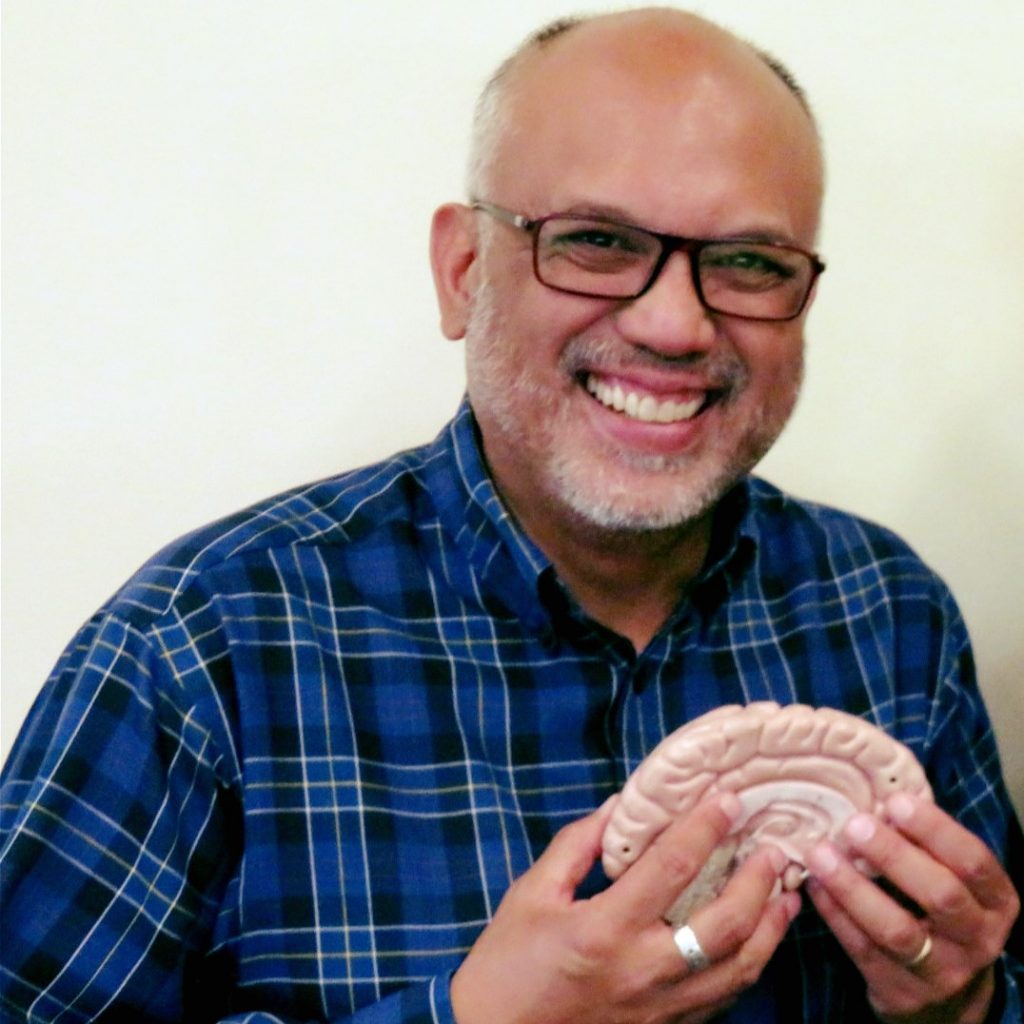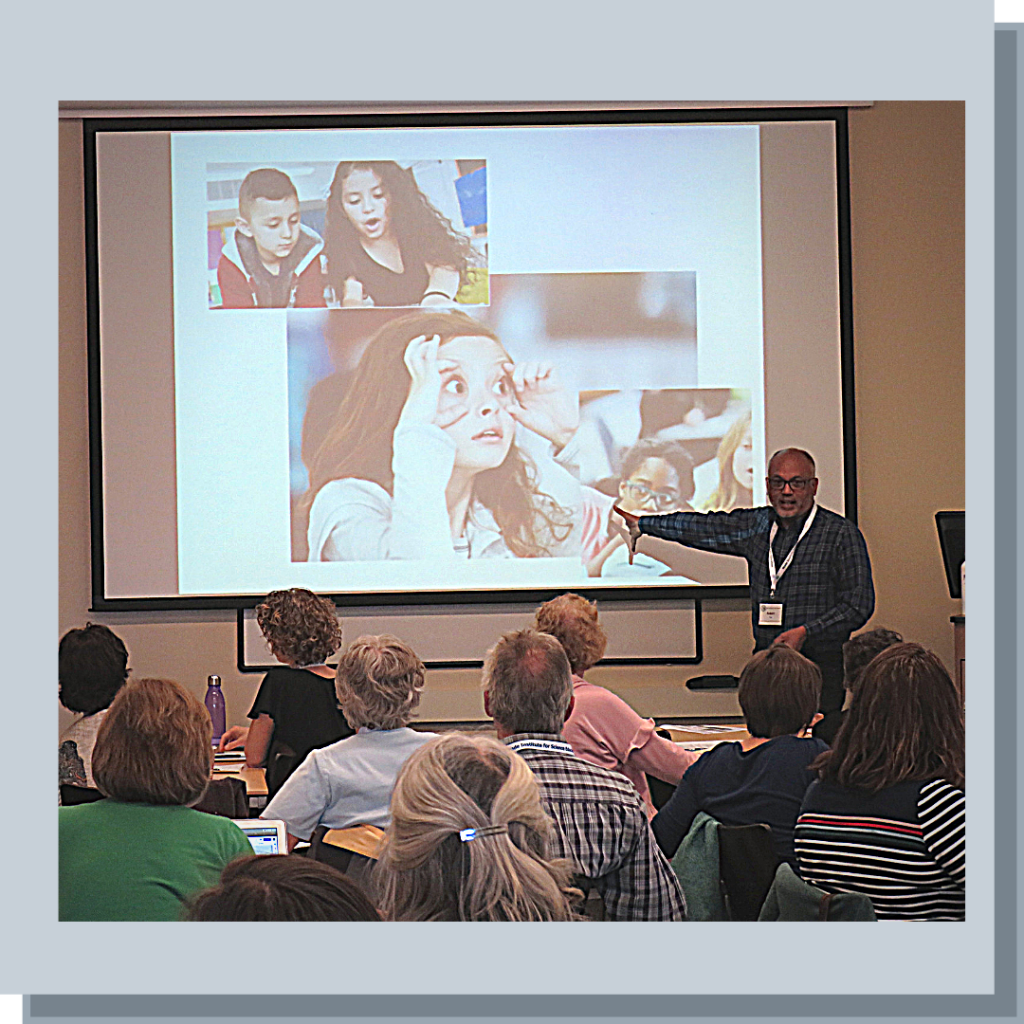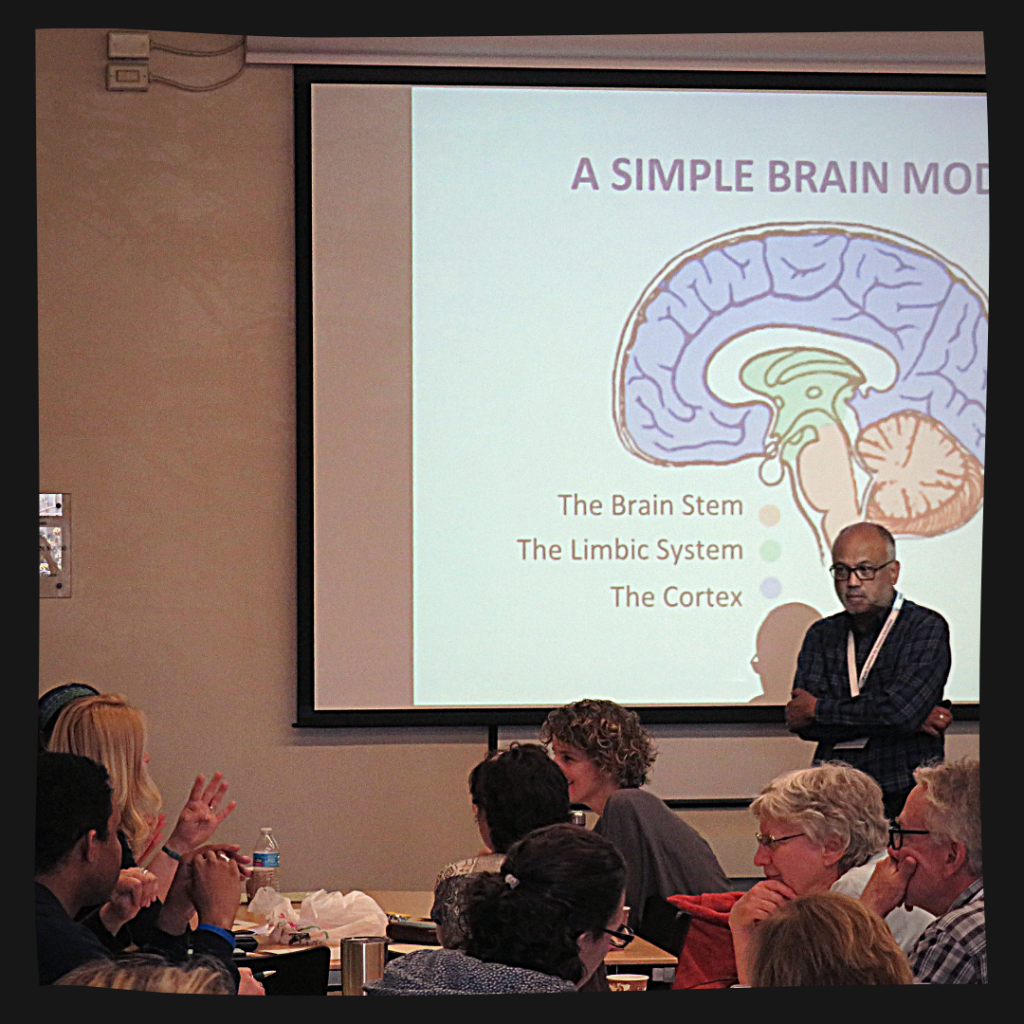Thursday, March 18, 2021
For Immediate Release
Embracing Change in Education: An interview with Rob Payo
Quincy, MA & Denver, CO – Rob Payo, Director of K-12 Education at Denver Urban Gardens, has been keeping current on changes in education through a variety of ways. He is fascinated by the cognitive science that describes the biological and psychological reasons for why and how learning occurs, and he has been keeping pace with impacts of the COVID-19 pandemic on student learning outcomes in STEM education. In 2019, Rob presented about minds-on learning and brain science during a well-received and interactive, inquiry-based Wade Institute Professional Development Seminar. Now, he returns to collaborate with the Wade Institute for Science Education as a guest educator during the Focus Workshop, “Learning and the Brain in the ‘New Normal’ Classroom.”

Rob Payo shares his expertise in mind and brain science with other educators by leading professional development programs.
Formerly with the Denver Museum of Nature and Science (DMNS), Mr. Payo helped to coordinate a collaboration between DMNS, the American Museum of Natural History in New York and the Exploratorium in San Francisco to educate teachers on learning and the brain. He has helped hundreds of teachers apply these approaches in their teaching at local and national levels. How can he help you transition back to the classroom after a year of remote learning? Learn more about Rob Payo in this candid interview, and find out why STEM education (and learning) is both personal and emotional.
How did your career in education begin?
I had a realization in my junior year in college that I didn’t want to go to medical school, and so I enrolled in an education course. Since I really liked it, I decided that I wanted to teach.

Educators learn from Rob Payo during the Wade Institute’s 2019 Professional Development Seminar Series.
What are some take-aways from your work at the national level that you’ve applied to your day-to-day programming?
The biggest thing is being able to reach out to other people and organizations to find ways to collaborate. That used to really intimidate me, but now I’m so used to reaching out to people and asking what they’re doing, what their priorities are, and how we can work together that the experience has paid off in some really great partnerships (like working with the Wade Institute for example).
How has collaboration come into play in your career as an educator?
Collaboration is huge. This has been especially true with the understanding and adopting the new NGSS standards. We all have needed to work together and continue to work together to realize the potential of these standards. I think also the call for greater equity in science education, in organizations, in the workplace, and in our daily lives also requires us to learn and challenge one another and to work together more to make effective change.
How are you embracing change amidst the COVID-19 pandemic?
It has certainly forced us to be more nimble, to change and “pivot” (the word of 2020) quickly. That’s both been rewarding and frustrating at times since it’s meant learning the rules of a changing game, only for it to change again and having to adapt and adjust to the new circumstances all over again. In my current work, I was faced with a new job having to run programming for schools without being able to physically be in the schools. I called upon my strengths to collaborate with other organizations and run remote programming. Right now, I am partnering with the Denver Botanic Gardens on a virtual classroom program and also with Slow Food Denver to run online cooking classes for elementary students that emphasize how fun cooking can be and to eat healthy foods.
What has changed in the field of education since we talked in 2019?
Certainly our understanding and shared experience of teaching remotely has changed. We all are trying to figure out how to teach more effectively and some of that has to do with learning new ways to keep students engaged remotely, to get kids to collaborate online, and to use digital tools and resources more than we have before. Equity has also been elevated to the forefront and I recently learned the term, “Culturally and Linguistically Sustaining Education.” This is a step moving from being culturally responsive to being culturally sustaining and how we value cultural perspectives more and to break patterns and systems that I certainly grew up with as a minority in a predominantly white neighborhood.
What do you perceive to be the greatest challenges of science educators during the COVID-19 pandemic?
Everyone’s concern centers around the health and well being of students. Not being able to have a physical presence with kids and still supporting them is the biggest challenge.
In what ways do you feel educators in our country have excelled through the changes to education over the past year?
We’ve all become more versed in using technology, so it will be interesting to see how we can use what we’ve learned back in the face-to-face classroom.
How are you supporting educators through this challenging time and into the ‘new normal’ phase?
I’m trying to be a support for teachers. During the pandemic, I’ve done a lot of work helping teachers identify tools and approaches that they can use in a remote teaching environment. When I was at the Denver Museum of Nature and Science, I started a regular weekly program, Tea Time on Tuesdays. It’s a 30-minute program where we feature a guest speaker that is in some way using technology tools in their teaching. We then gave time for teachers to talk to one another and support one another in smaller breakout group discussions. Even after I left, the program has continued and will celebrate a 1one-year anniversary this month.
In my current work, I’ve continued that approach of offering support for teachers and really listening to them to see what serves them and their students.
What does ‘new normal’ mean in terms of science education?
Like everything else in our lives, the effects of the pandemic will last a lifetime. The way we teach has changed and will influence how we teach in the future. The way we relate to one another has changed, and our familiarity with how to connect with people across the country and across the world will make it easier for students to find their own connections to people and organizations that we wouldn’t even have considered connecting to before the pandemic are now just a login away.
Again, issues of equity and social justice are less theoretical. They’re more real and present the opportunity to apply what we learn into real world situations.
How do you keep fresh on the topics of cognitive science, educational psychology, and neuroscience? Why is it important to you as an educator to keep current on these topics and apply them to your own practice of teaching?
I just love to learn and I have always been fascinated by these topics. I have learned a lot from attending the annual, “Learning & the Brain,” conference where scientists and researchers present to educators about the latest trends in what we know about the brain. In my workshop, I’m emphasizing how what we know about the brain has come into play in remote learning and how we can use that to teach better. We are all in the business of learning how our students learn and how their brains work. This research will only continue to grow and be more significant in the years to come, so teachers really can benefit from understanding it more. The challenge is having the time to research. That’s why I’ve dedicated a lot of my work to letting teachers know more about it and to do my best to apply it and model it in my own teaching.
What new models, programs, and/or activities are you developing and implementing at Denver Urban Gardens, and how are those building upon your past experiences?
As I mentioned, I’ve done a lot of collaborative work with other organizations to run programming. I think the silos have broken down a lot more and people are more willing to work together than before. I’m currently taking a social permaculture course as a participant. It’s really interesting, since it focuses on metaphors and structures for relationships and organizational structures that reflect the natural processes of nature, how nature works in harmony, and what we can learn from that using metaphors for how we create healthier soil as well as to yield better relationships in how we treat and interact with one another in a more sustainable way.
Why does learning about how we learn matter?
It makes you a better teacher. It helps you to understand your students better. It helps you to rely less on your “go to” approaches and to diversity the way you teach, while recognizing not only the academic aspects of learning, but the social, emotional, psychological, and cognitive aspects to learning.

Rob Payo helps educators think about how we learn to improve their teaching practice.
During a Focus Workshop provided by the Wade institute for Science Education and featuring guest presenter Rob Payo, educators will meet virtually to refine their understanding of how we learn and how the brain works. They will overview brain function and explore topics including working memory and retention, the importance of movement, and other strategies that help to support learning. Through these interactive virtual sessions filled with rich discussion and engaging content, educators will dive into the latest research in mind and brain science and how it applies to teaching. Participants will have an opportunity to share how remote learning and the pandemic affected their students and themselves from both cognitive and social/emotional perspectives and what that means as we enter a “new normal” in the classroom. Educators will take away strategies and approaches that can be applied to their remote, hybrid, or in person classrooms the next day!
Learn more about our Focus Workshop, “Learning and the Brain in the ‘New Normal’ Classroom,” by visiting https://www.wadeinstitutema.org/focus-workshops.
###
The Wade Institute for Science Education specializes in providing inquiry-based, hands-on, minds-on, science, technology and engineering professional development for K-12 teachers and informal educators. For more information, visit www.wadeinstitutema.org or call 617-328-1515.
